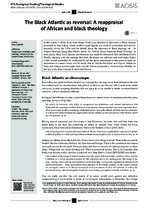The Black Atlantic as reversal: a reappraisal of African and black theology
| dc.contributor.author | Engdahl, Hans | |
| dc.date.accessioned | 2017-10-10T06:49:37Z | |
| dc.date.available | 2017-10-10T06:49:37Z | |
| dc.date.issued | 2017 | |
| dc.identifier.citation | Engdahl, H. (2017). The Black Atlantic as reversal: a reappraisal of African and black theology. HTS Teologiese Studies/ Theological Studies, 73(3): a4618 | en_US |
| dc.identifier.issn | 2072-8050 | |
| dc.identifier.uri | https://dx.doi.org/ 10.4102/hts.v73i3.4618 | |
| dc.identifier.uri | http://hdl.handle.net/10566/3221 | |
| dc.description.abstract | In this article, I will try to do three things. Firstly, pay attention to the notion of Black Atlantic as coined by Paul Gilroy, which in effect could signify a reversal of colonialism and slavery. Secondly, revisit the 1970s and the debate about the relevance of Black theology vis-à-vis African theology, using John Mbiti’s article ‘An African Views American Black Theology’ as entry point. Here, I will discuss contributions also made by Desmond Tutu and James Cone. Thirdly, starting with the premise that both theologies are relevant and soul mates today, which would (probably) be confirmed by all the above mentioned at this point in time, an assessment of current voices will be made, that is, Tinyiko Maluleke and Vuyani Vellem on black and African ecclesiologies from a South African perspective, and Lawrence Burnley on the fate of the Black Church in the United States. | en_US |
| dc.language.iso | en | en_US |
| dc.publisher | AOSIS | en_US |
| dc.rights.uri | © 2017. The Authors. Licensee: AOSIS. This work is licensed under the Creative Commons Attribution License. | |
| dc.subject | Black Atlantic | en_US |
| dc.subject | African theology | en_US |
| dc.subject | Colonialism | en_US |
| dc.subject | Ecclesiologies | en_US |
| dc.title | The Black Atlantic as reversal: a reappraisal of African and black theology | en_US |
| dc.type | Article | en_US |
| dc.privacy.showsubmitter | FALSE | |
| dc.status.ispeerreviewed | TRUE |

